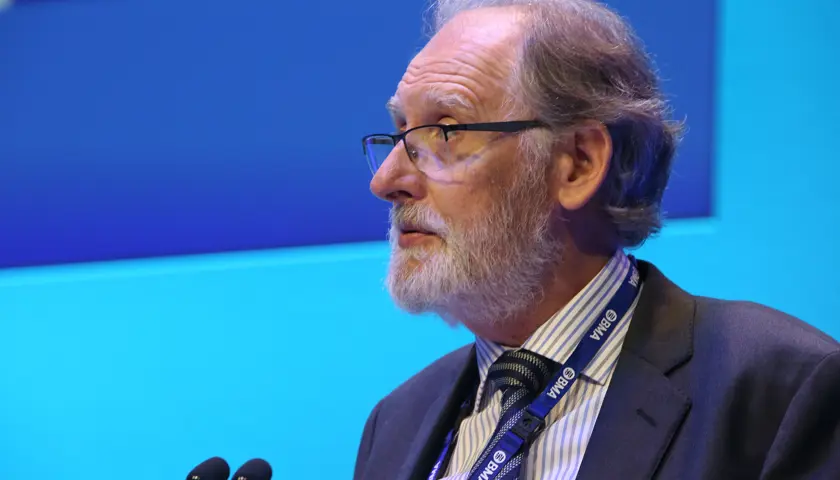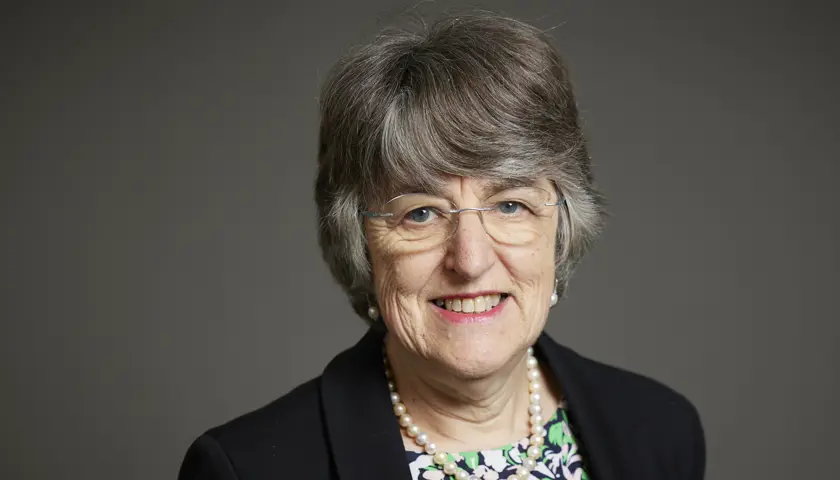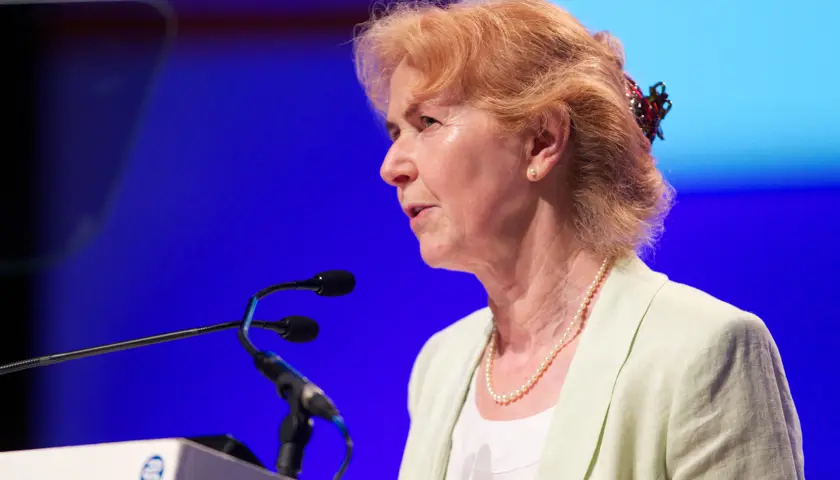The long road to consensus
The long road to consensus
To be an effective voice for patients and doctors in the debate on assisted dying, the BMA had to reach points of consensus between doctors with opposing views. Seren Boyd hears how they got there
The debate raging around the bedside of the terminally ill patient is more febrile than ever.
Society will decide: the Isle of Man is now set to legalise assisted dying, and similar bills are making steady progress through other jurisdictions in the UK and the Crown Dependencies.
Doctors are united in the desire to protect patients but divided on what this should look like in law. From its position of neutrality on whether assisted dying should be legalised, the BMA has been a forum for airing wide-ranging opinions and a significant voice in the national debate.
Consultation and consensus building at the BMA has been a lengthy process but ultimately a successful one. The BMA has developed a clear position on many issues that would affect doctors, which has gained widespread support and influenced the shape of legislation.
Yet, although the BMA has a position of neutrality, most individual members are far from neutral on the issue of assisted dying.
Andrew Green, chair of the BMA medical ethics committee, believes the diversity of opinion in its ranks is the very reason the BMA is seen as a credible and respected contributor to the national conversation.
‘It has been a huge advantage having people with a wide range of views within our membership, and on our committee,’ says Dr Green, a retired GP. ‘I genuinely believe that we would not be in this position, as a thought-leader influencing other organisations and a voice that legislators want to hear from, had we not heard all those arguments and had all those discussions.’
One thing both sides of the debate can agree on is that it has been a long journey – and it is far from over.
Range of views
Two and a half years ago, the MEC was tasked with shaping a BMA position on assisted dying and a set of proposals it felt any future legislation would need to address.
The committee’s membership reveals the scale of the challenge. The MEC boasts a distinguished line-up of elected members and appointed experts (including barristers, theologians, ethicists, lawyers and a patient representative) – and prominent, passionate campaigners on each side of the debate.
Consultant radiologist Jacky Davis was in favour of the patient’s right to choose even before her mother’s protracted and difficult death from cancer. Dr Davis spoke up in support of assisted dying at a BMA annual representative meeting even before her brother’s suicide following a terminal cancer diagnosis of his own.
‘Medical paternalism is largely a thing of the past except in this one instance at the end of life where some doctors continue to think that they know better than their patients,’ she says.
Palliative care consultant Baroness Ilora Finlay, meanwhile, saw her parents live fulfilling lives long after terminal prognoses; her mother lived for four good years with metastatic cancer after being given a prognosis of weeks. Her experience of caring for ‘thousands’ of dying patients has led her to conclude the terminally ill would be better served by better palliative care.
‘You change the law, not for one person but to protect the population,’ she says. ‘Such legislation makes assisting suicide a medical treatment with potential unintended consequences. Is it safer to not change it? Our patchy palliative care provision needs addressing as a priority to support patients, their families and over-stretched clinicians.’
Yet, the task at hand required individuals to find a collective BMA position. ‘We went into it knowing that we had to come out with recommendations,’ says Dr Davis. ‘We couldn’t just sit there, fold our arms and say no. It was clear the BMA had to have a position so that we were at the table.’
Given the need to represent diverse and starkly opposed opinions, the MEC kept four different groups in mind during all its discussions, says Dr Green: ‘Doctors who might want to participate [in assisted dying], doctors who wanted nothing to do with it, patients who might want it and patients who were very worried by it.’
There followed months of rigorous debate led by the then MEC chair Jan Wise, around briefings prepared by the BMA medical ethics and human rights department. The BMA also consulted widely with other medical associations and doctors in countries where assisted dying has already been legalised.
The MEC rules of engagement demanded politeness, respect and well-argued submissions, along with the ability to listen to views from all sides.
‘We were clear early on that we needed to balance the interests of different groups, and to represent and protect the views and interests of all members,’ says Veronica English, BMA head of medical ethics and human rights.
Expert witness
After a year of deliberations, including consultation with other BMA committees, the MEC succeeded in producing a position paper on its views to inform its engagement with parliamentarians – and in gaining approval for it from all four BMA councils: UK, Scotland, Wales and Northern Ireland.
Dr Green is convinced these clear demands have secured the BMA an audience with legislators in all UK parliaments considering assisted dying bills. Many of the BMA’s views were incorporated into Labour MP Kim Leadbeater’s bill when it was published – following earlier meetings with her – and this has continued at committee stage.
In February, Dr Green was among the first expert witnesses providing oral evidence in Westminster to the committee of MPs that was set up to scrutinise Ms Leadbeater’s bill. The BMA subsequently provided regular briefings to the committee as it scrutinised the bill and its many hundreds of proposed amendments.
Strong BMA engagement has meant legislators have taken on board many of its concerns, says Dr Green. An ‘opt-in’ model for doctors, for example, now forms part of legislative proposals in the Isle of Man, Jersey and England and Wales. Scotland is now considering an opt-in clause, something not included in Liberal Democrat MSP Liam McArthur’s bill.
Other organisations have followed the BMA’s lead, reflecting and reinforcing its positions.
We were clear early on that we needed to balance the interests of different groups
Veronica English, BMA head of medical ethics and human rights
These achievements are all the more significant given the BMA’s long, complex relationship with the assisted-dying debate.
It is now 10 years since the BMA conducted a major piece of research among members and the public into their experiences, views and perceptions of end-of-life care and physician-assisted dying.
A survey of all BMA members in 2019 was one of the biggest surveys of medical opinion ever undertaken on assisted dying, with nearly 29,000 responses – and proved a major tipping point.
It showed that the medical profession was divided on the issue: for example, 50 per cent of respondents said they were personally supportive of a change in the law to permit doctors to prescribe drugs for self-administration by eligible patients, 39 per cent were opposed and 11 per cent undecided. The BMA moved to a position of neutrality on assisted dying in 2021.
Dr Davis, who is chair of Healthcare Professionals for Assisted Dying, had pushed for such a survey for years. Her goal was BMA neutrality which would shift the framing of the debate from ‘whether or not’ it should become law to ‘what if?’.
Dr Green believes neutrality has given the BMA the ability to access and influence the debate in a way that opposition did not. ‘It has also enabled us to engage honestly with people with a wide variety of views in order to try and find the common ground all people can agree on once they've put aside the question about whether it should be allowed or not,’ says Dr Green.
Yet, he is also keenly aware some members remain opposed to fundamentals such as the BMA’s position of neutrality – including Baroness Finlay, a former BMA president.
She too has been part of the national debate for more than a decade, as a doctor, member of the Lords and founder-director of the thinktank Living and Dying Well. She co-edited a book on the subject as recently as last autumn.
'Deep emotions'
Dr Green insists the BMA could not have achieved all it has without the hard work and commitment of the secretariat and MEC members, including Baroness Finlay and Dr Davis.
He recognises there has been a personal cost for all involved, including the wider membership. Everyone has had to interrogate their own beliefs; some have changed their opinions on certain aspects of the debate.
However, it has been harder for some, especially perhaps now for those who are dismayed by the direction of travel in the assisted-dying debate in wider British society.
‘This sort of discussion is always easiest for those with fewer deep convictions,’ says Dr Green. ‘I understand how difficult it is for some even to have their professional body talking about this.
‘These issues strike at the very heart who we are as people and professionals, and often involve very deep emotions about those we love.
‘I have enormous respect for people who have strong personal feelings but have been able to see things from others’ points of view. And we’ve had that in abundance in the committee and the membership.’
Dr Davis and Baroness Finlay are sympathetic to the other side’s position – even if they dispute the veracity of evidence being marshalled to support their arguments.
They remain committed to the debate – albeit steadfast in their positions. As Dr Davis puts it succinctly: ‘You have to engage with people who are coming from the other side because, if you don’t, they’ll win the argument.’
Baroness Finlay, who was re-elected to the MEC last June, says, ‘I have to speak out.
‘The current private members’ bill before Parliament has weakened oversight now and several areas of ambiguity for doctors which will not be sorted out in regulations. Surprisingly, amendments to close such loopholes have been rejected by the proponents.
‘This is about the fundamental role of medicine and what we should and should not be doing.’
Vital to be involved
It is because this is such a fundamental issue for doctors, says Dr Green, that the BMA has needed to engage in the debate and why it must continue to do so if legislation is passed. The very real prospect now of assisted dying being legalised in one jurisdiction in the British Isles before another raises pressing issues for doctors working across borders in shared-care arrangements, for example.
The experience of doctors in countries such as Spain where medical associations have not engaged and doctors have found themselves with fewer protections is a sobering lesson, believes Dr Green.
‘Being involved in such an important societal change – probably the biggest change in the way that governments influence what we do with our bodies since [the Abortion Act of] 1967 – has been vital for the BMA,’ he says.
‘We would have failed our members if legislation passed and we had not engaged with the debate, and there were none of the protections that we're succeeding in getting in place. This debate is not going to go away.’
The BMA’s key ‘asks’ in any legislation on assisted dying
General approach
- An ‘opt-in’ model for doctors to provide assisted dying
- A right to refuse to carry out activities directly related to assisted dying, for any reason.
Protection from discrimination and abuse
- Statutory protection from discrimination
- Provision for safe-access zones.
Delivering an assisted-dying service
- Assisted dying arranged, but not necessarily delivered, as a separate service (eg through a network of specially trained doctors)
- No duty to raise, or prohibition on raising, the issue of assisted dying with patients
- An official body to provide information for patients
- Adequate funding and equitable access.
Oversight and regulation
- Open and transparent regulation
- The collection and publication of data
- A post-death review for every assisted death, as and when they occur.
Legislative proposals in the UK and Crown Dependencies
England and Wales: Kim Leadbeater MP’s Terminally Ill Adults (End of Life) Bill
Passed second reading in the Commons and completed committee stage (line-by-line consideration) on 25 March. Report stage is scheduled for 25 April 2025
Isle of Man: Alex Allinson MHK’s Assisted Dying Bill
Passed by the House of Keys and Legislative Council and will now be sent for Royal Assent
Jersey: Assisted Dying Law
The States Assembly agreed in principle to legalise assisted dying in November 2021. Detailed policy proposals have been prepared and agreed, and a bill to implement those proposals is being drafted. Debate on the bill is due by the end of 2025
Scotland: Liam McArthur MSP’s Assisted Dying for Terminally Ill Adults (Scotland) Bill
Currently at Stage 1: consideration by the Scottish Parliament’s Health, Social Care and Sport Committee. Its report is due by 23 May. Debate by the full Parliament to follow.
Find out about the latest developments on physician-assisted dying
(Image credit for Ilora Finlay: House of Lords / photography by Roger Harris)
(Main image credit: Getty)






